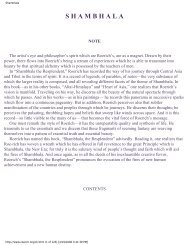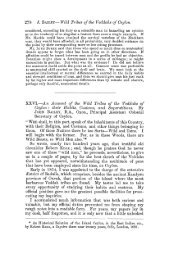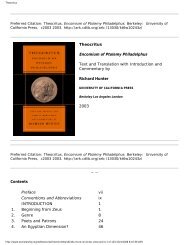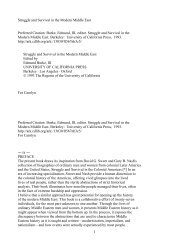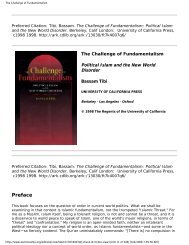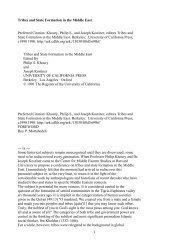Between Two Worlds Kafadar.pdf
Between Two Worlds Kafadar.pdf
Between Two Worlds Kafadar.pdf
You also want an ePaper? Increase the reach of your titles
YUMPU automatically turns print PDFs into web optimized ePapers that Google loves.
Zoroastrian.[37] In addition to this newly imported enthusiasm (supported by the<br />
Ilkhanids) for the (re)conquest of lands for Islam, the internal weakness of<br />
Byzantium, and the lack of "Islamic fanaticism" among the early Ottomans that<br />
facilitated the incorporation of quasi-Islamic Turks and Mongols as well as<br />
renegades from Christianity, Togan cited the location of Osman's tribe right<br />
near the major Byzantine-Ilkhanid trade route as the factors that made it<br />
natural for Turkish warriors to conceive of expanding their power and building a<br />
state.[38] The rest was good leadership, adoption of sound administrative<br />
practices (thanks primarily to the Ilkhanid legacy), support given to and<br />
received from ahis and dervishes, and a well-regulated colonization policy after<br />
crossing to Rumelia.<br />
The significance of commerce was to be considered from another perspective by<br />
Mustafa Akdag ( 1913-72), a Turkish historian who chose to focus on some<br />
references in the Ottoman chronicles concerning exchange between Osman's tribe<br />
and their Christian neighbors; from those, he developed a bold theory proposing<br />
the existence of a "Marmara-basin economy" that emerged as an integrated unit at<br />
the time of Ertogril and Osman. The state that was created by them gave<br />
political expression to that economic reality and expanded along routes that<br />
linked the Marmara basin to other regional economies. This thesis never had a<br />
chance to gain any recognition, however, since it was soon demolished on the<br />
grounds of flimsy evidence and sloppy reasoning by a student of Köprülü, Halil<br />
Inalcik , who was to emerge as the leading Ottomanist of his generation and make<br />
his own contributions to various problems of early Ottoman history.[39] Even<br />
though Akdag elaborated the same views in a later book, [40] with a yet stronger<br />
emphasis on commerce, symbiosis, and rosy relations between Turks and Byzantines<br />
or Balkan peoples, his views were not supported by any new evidence that<br />
responded to former criticisms; the book failed to have an impact on<br />
professional historians though it was widely read by the public. Considering<br />
that its author suffered imprison-<br />
― 46 ―<br />
ment for his leftist views after the military intervention of 1971, the book is<br />
rather a curious reminder of the fact that certain significant strands of the<br />
nationalist discourse such as the purely positive assessment of the Turkish<br />
conquests cut across both sides of the political spectrum in Turkey.[41]<br />
Speros Vryonis, a Greek-American (and a Byzantinist, as some reviewers noted,<br />
much to his resentment), published his monumental work on medieval Anatolia in<br />
1971.[42] It covered the period that saw the rise of the Ottoman state but was<br />
not directly concerned with that specific phenomenon. Vryonis rather traced the<br />
broad currents of demographic movement, nomadization, and religious and cultural<br />
change in Asia Minor that, over four centuries, transformed what was a<br />
Hellenic/Greek Orthodox peninsula into a predominantly Islamic one dominated by<br />
a Turcophone political elite. In the shortest summary of the set of conclusions<br />
he reached at the end of his exhaustive research, he wrote that "the Turkish<br />
success ultimately was a product of the dynamics of Byzantine decline and<br />
Turkmen (nomadic) demographic pressure."[43] As for the role of frontier<br />
warriors in that process, whose absence in the book was noted by a reviewer,<br />
45




